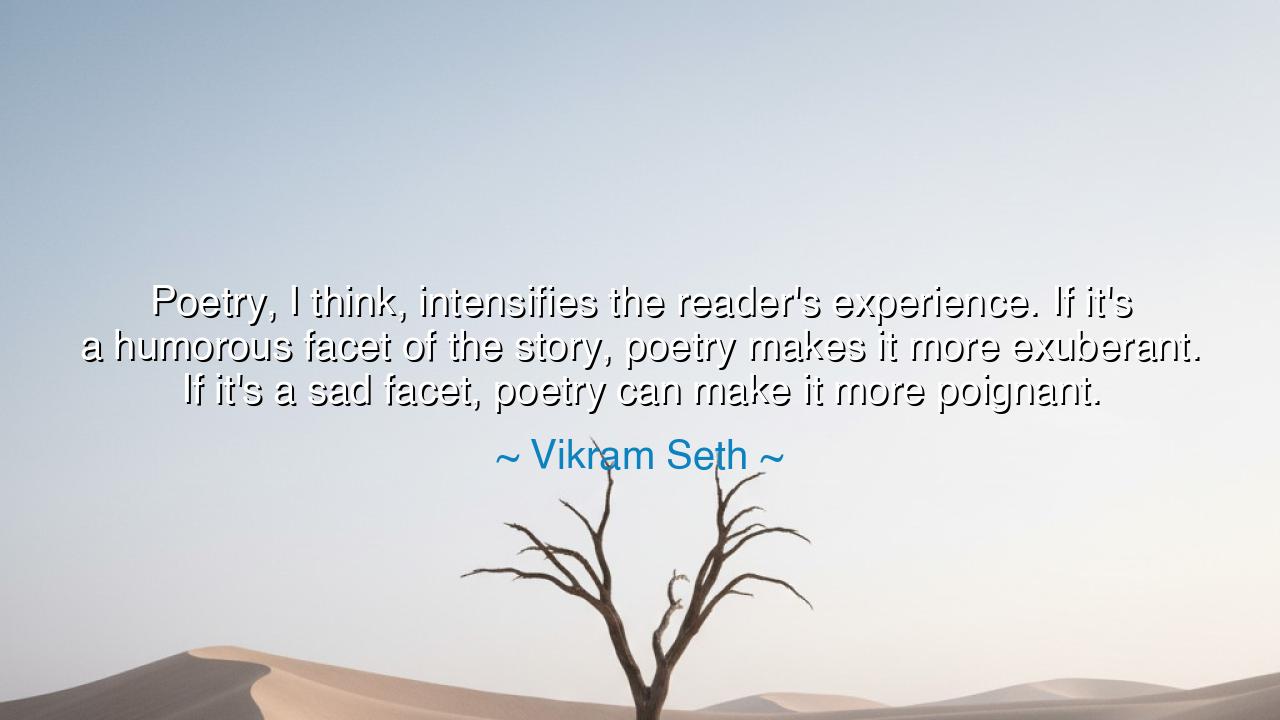
Poetry, I think, intensifies the reader's experience. If it's a
Poetry, I think, intensifies the reader's experience. If it's a humorous facet of the story, poetry makes it more exuberant. If it's a sad facet, poetry can make it more poignant.






Hear the words of Vikram Seth: “Poetry, I think, intensifies the reader's experience. If it's a humorous facet of the story, poetry makes it more exuberant. If it's a sad facet, poetry can make it more poignant.” This is no idle observation, but a truth drawn from the well of human memory, a recognition that words, when touched with rhythm and beauty, pierce more deeply into the soul. Poetry is not merely ornament, nor is it only a craft of pleasing sounds—it is the fire that magnifies emotion, the vessel that carries laughter higher, and sorrow deeper.
Consider how the ancients held poetry as sacred. Homer did not merely recount battles; he sang them, so that the clash of spears echoed in the hearts of men long after the words had passed. When Achilles grieved for Patroclus, it was not just a tale of friendship lost—it was grief itself, carved into verse, so that all generations might feel the weight of loss. What Vikram Seth says is but the continuation of this eternal wisdom: poetry intensifies life, transforming common feeling into something noble, unforgettable, eternal.
The world has seen this in its own tragedies and triumphs. Recall the speeches of Winston Churchill during the darkest hours of war. Though not written as formal poetry, they bore its rhythm and its fire. When he said, “We shall fight on the beaches,” the cadence lifted weary spirits, transforming fear into courage. Without the power of poetic expression, the words might have been a report, dry and uninspiring. But clothed in the rhythm of poetry, they became a torch in the night, a strength for millions who stood at the edge of despair.
And yet, poetry is not only for the heroic and the grand. It resides, too, in the laughter of children, in love letters, in the smallest observations of daily life. As Seth reminds us, when a tale is humorous, verse can heighten its joy, turning a chuckle into full-hearted mirth. When a tale is sorrowful, poetry turns the tears into rivers, flowing through generations of readers, binding them in shared humanity. It is this duality—exuberance and poignancy—that makes poetry the highest form of storytelling, capable of carrying both the crown of joy and the cloak of sorrow.
The lesson here is clear: if we wish to live fully, we must not shy away from poetry. It is not a luxury but a necessity, for it reminds us how deeply we can feel. To speak plainly is to communicate; to speak poetically is to transform. Just as food sustains the body but wine uplifts the spirit, so does prose sustain thought while poetry nourishes the soul. Seth teaches us that to truly taste life’s moments, we must allow them to be touched with poetic vision.
What then must we do? Seek poetry in all things. Do not wait only for the written verse—find it in the patterns of nature, in the rise and fall of your own breathing, in the words you speak to those you love. Write your own lines, however humble, and see how sorrow becomes lighter, and joy more radiant. Memorize a stanza that speaks to you, and carry it like a talisman in your heart. Share it with a friend in their hour of grief or their hour of triumph, and you will see how poetry binds souls together.
Let this be the inheritance: to honor poetry not as distant art but as the living heartbeat of human expression. For it is poetry that magnifies laughter into triumph and sorrow into wisdom. When life gives you joy, let poetry sing it until it echoes like thunder. When life brings sorrow, let poetry cradle it until it becomes a lesson for others. Thus, your life itself becomes a poem, written not in ink, but in the hearts of those who walk with you.
And so, remember Vikram Seth’s words: poetry intensifies. It makes us more alive, more human, more awake to the miracle of existence. Do not neglect this gift. Practice it, honor it, live it—and in doing so, you will walk not as one who merely survives, but as one who truly feels the depths and the heights of being.






AAdministratorAdministrator
Welcome, honored guests. Please leave a comment, we will respond soon